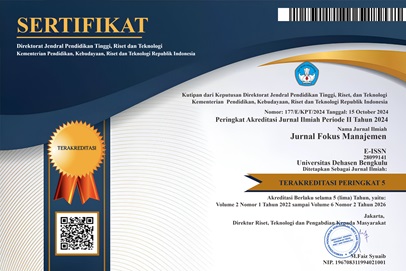The Effect of Communication and Work Spirit on the Effectiveness of Employee Performance at Work Training Center in Seluma Regency
Abstract
This study was aimed to determine the effect of communication and spirit on the effectiveness of employee performance at Job Training Center in Seluma Regency. The sample of this study was 38 employees at Job Training Center in Seluma Regency. The data was collected by using a questionnaire and then analyzed by using multiple linear regression, determination test and hypothesis testing. The results showed a positive regression direction, Y = 0.973 + 0.370X1 + 0.625X2. It showed that there is a positive influence between X1 (communication) and X2 (work spirit) on work effectiveness (Y). Means that if the variables of communication and morale increase, it will increase work effectiveness. The value of the coefficient of determination is 0.595. This means that X1 (communication) and X2 (work spirit) affect the effectiveness of work performance (Y) by 59.5% while the remaining 40.5% is influenced by other variables not examined in this study. The results of the t-test at a significance level of 0.05 explained that partially the communication and work spirit variables had a significant influence on the effectiveness of employees work performances at Job Training Center in Seluma Regency. Moreover, the F test results at a significance level of 0.05 explained that the communication and work spirit variables has a significant simultaneous effect on effectiveness of employees work performance at Job Training Center in Seluma Regency.
Downloads
An author who publishes in the Jurnal Fokus Manajemen (JFM) agrees to the following terms:
Author retains the copyright and grants the journal the right of first publication of the work simultaneously licensed under the Creative Commons Attribution-ShareAlike 4.0 License that allows others to share the work with an acknowledgement of the work's authorship and initial publication in this journal
Submission of a manuscript implies that the submitted work has not been published before (except as part of a thesis or report, or abstract); that it is not under consideration for publication elsewhere; that its publication has been approved by all co-authors. If and when the manuscript is accepted for publication, the author(s) still hold the copyright and retain publishing rights without restrictions. For the new invention, authors are suggested to manage its patent before published. The license type is CC-BY-SA 4.0.
Jurnal Fokus Manajemen (JFM) is licensed under a Creative Commons Attribution-ShareAlike 4.0 International License.
You are free to:
Share — copy and redistribute the material in any medium or format
Adapt — remix, transform, and build upon the material
for any purpose, even commercially.
The licensor cannot revoke these freedoms as long as you follow the license terms.






